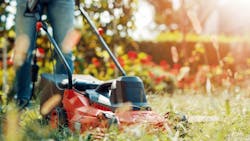Summer Activities Could Cause Exposure to Hazardous Noise Levels
The birds are chirping. The sun is shining. Your lawn is green and lush, which means it’s time for a cut. The roar of the lawnmower brings about the first sign of summer fun, but it also is one of the many instances during the season that a person is exposed to hazardous noise.
Citing new research, Ball State University audiologists are warning people to use hearing protection during activities that may exposure them to hazardous noise this summer such as mowing the lawn, concerts and fireworks.
“Similar to a helmet when riding a bike or a seat belt in a vehicle, hearing protection is critical safety equipment when you go to a concert, a fireworks display or an auto race,” says Blair Mattern, an audiology professor and director of Ball State’s audiology clinic in a statement. “Hearing loss is preventable – just avoid loud sounds or wear protection.”
While sounds louder than 80 decibels have the potential to cause permanent damage, noise created by fireworks, traffic, concerts and landscaping equipment ranges between 90 and 140 decibels.
“New research has revealed that people may suffer irreversible damage to their auditory systems after only brief exposure,” said Lynn Bielski, a Ball State audiology professor. “This type of damage may not result in an immediately noticeable hearing difficulty to the individual, so it has been called ‘hidden hearing loss.’ It could take years for someone to notice as the ability to hear is reduced just a little with exposure.”
The audiologists also warn that loud noises put children’s hearing at risk, citing recent studies that found about 12.5 percent of American children (about 5.2 million) have hearing loss caused by noise exposure.
Signs of hazardous noise exposure, according to the audiologists, include:
- You can’t understand someone talking two feet away.
- Speech sounds muffled.
- You suffer pain or ringing in the ears immediately after the exposure.
- Others must raise their voices to be understood.
“Our hearing is one of our senses that we oftentimes take for granted,” Mattern says. “Excessively loud noise, music or other sound exposure will damage our hearing. We need to take responsibility and protect it.”
